

V-Initiative. Fiction of Law. UN calls for action over 12 million stateless people. Search. Joel Slater. Joel Laverne Slater (April 30, 1960 – March 26, 2008) was an American activist who renounced his citizenship in 1987 in Australia, voluntarily making himself stateless to protest U.S. foreign policy.
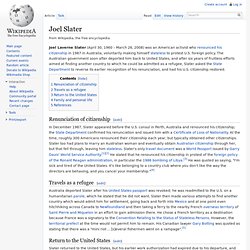
The Australian government soon after deported him back to United States, and after six years of fruitless efforts aimed at finding another country to which he could be admitted as a refugee, Slater asked the State Department to reverse its earlier recognition of his renunciation, and had his U.S. citizenship restored. Renunciation of citizenship[edit] Travels as a refugee[edit] Return to the United States[edit] Slater returned to the United States, but his earlier work authorization had expired due to his departure, and his Social Security Number was no longer valid.
Family and personal life[edit] Slater was born in Waterloo, Iowa to Jerry L. References[edit] History. Press release. 10 December 2008 by Mike Gogulski Posted in diary | 49 Comments » Welcome, new friends and new visitors.
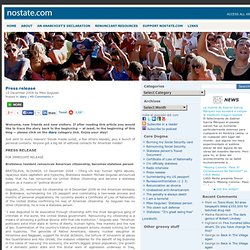
If after reading this article you would like to trace the story back to the beginning — at least, to the beginning of this blog — please click on the diary category link. Enjoy your stay! Just sent to every relevant Slovak media outlet, a few others besides, plus a bunch of personal contacts. Anyone got a big list of editorial contacts for American media? Bratislava resident renounces American citizenship, becomes stateless person BRATISLAVA, SLOVAKIA, 10 December 2008 – Citing US war, human rights abuses, rapacious state capitalism and hypocrisy, Bratislava resident Michael Gogulski announced today that he has renounced his United States citizenship and become a stateless person as a means of “political divorce”.
UN Conventions on Statelessness. The 1954 Convention relating to the Status of Stateless Persons and the 1961 Convention on the Reduction of Statelessness are key legal instruments in the protection of stateless people around the world and in the prevention and reduction of statelessness.
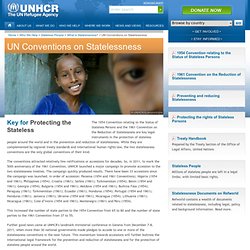
While they are complemented by regional treaty standards and international human rights law, the two statelessness conventions are the only global conventions of their kind. The conventions attracted relatively few ratifications or accessions for decades. The 1954 Convention relating to the Status of Stateless Persons: Implementation within the European Union Member States and Recommendations for Harmonisation. INTERNATIONAL PARLIAMENT » Presentazione Parlamento. Iversal Recognition of Inalienable Right to Self-Determination Most Effective Way of Guaranteeing Fundamental Freedoms, Third Committee Told. Sixty-seventh General Assembly Third Committee 30th & 31st Meeting (AM & PM) Hears from Some 35 Speakers in Day-Long Debate, With Focus on Eliminating Racism, Self-Determination, Human Rights Protections Universal recognition of the inalienable right to self-determination was the most effective way the global community could guarantee protection of fundamental freedoms, the Third Committee (Social, Humanitarian and Cultural) was told today, as it concluded discussion on several human rights issues.
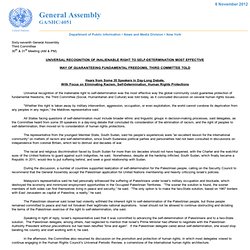
“Whether this right is taken away by military intervention, aggression, occupation, or even exploitation, the world cannot condone its deprivation from any peoples in any region,” the Maldives representative said. The racial and religious discrimination faced by South Sudan for more than six decades should not have happened, with the Charter and the watchful eyes of the United Nations to guard against such indignities, he said. The Committee will reconvene at 10 a.m.
Background Mr. Stuck in Samoa: The US refuses to take back this ‘stateless’ man. Please support our site by enabling javascript to view ads.
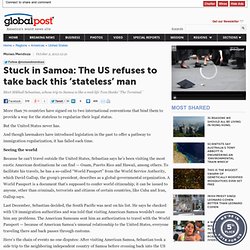
More than 70 countries have signed on to two international conventions that bind them to provide a way for the stateless to regularize their legal status. But the United States never has. And though lawmakers have introduced legislation in the past to offer a pathway to immigration regularization, it has failed each time. The Leader in Refugee Decision Support.
15 April 2014 UNHCR observations on the current asylum system in Bulgaria This UNHCR paper provides an assessment of the Bulgarian asylum system, including access to procedures, quality of the asylum adjudication mechanisms, as well as reception, accommodation and detention issues.
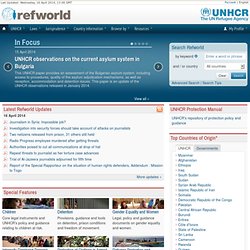
This paper is an update of the UNHCR observations released in January 2014. 31 March 2014 China: COI Compilation This report by the Austrian Centre for Country of Origin and Asylum Research and Documentation (ACCORD), commissioned by UNHCR, provides Country of Origin Information (COI) pertaining to political developments, the security situation, human rights issues and the rule of law in China. 05 March 2014 International Protection Considerations related to developments in Ukraine On 5 March 2014, UNHCR released International Protection Considerations related to developments in Ukraine. Untitled. Involuntary Governance. What if citizens were given a choice over the type of government they wanted?
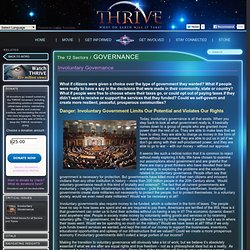
What if people were really to have a say in the decisions that were made in their community, state or country? What if people were free to choose where their taxes go, or could opt out of paying taxes if they didn’t want to receive or support the services that they funded? Could we self-govern and create more resilient, peaceful, prosperous communities? Danger: Involuntary Government Limits Our Potential and Violates Our Rights Today, involuntary governance is all that exists. It seems like such a radical notion that it is common to reject without really exploring it fully.
Involuntary governments also require money to be funded, which is collected in the form of taxes. Making the transition to voluntary governance will obviously take a lot of work, but we believe it’s absolutely essential if what we are after are equal rights and true freedom – not as a philosophical ideal but as a reality. Society for Invisible Outer-Nationals. Facebook. Untitled. The Only Effective Solution.